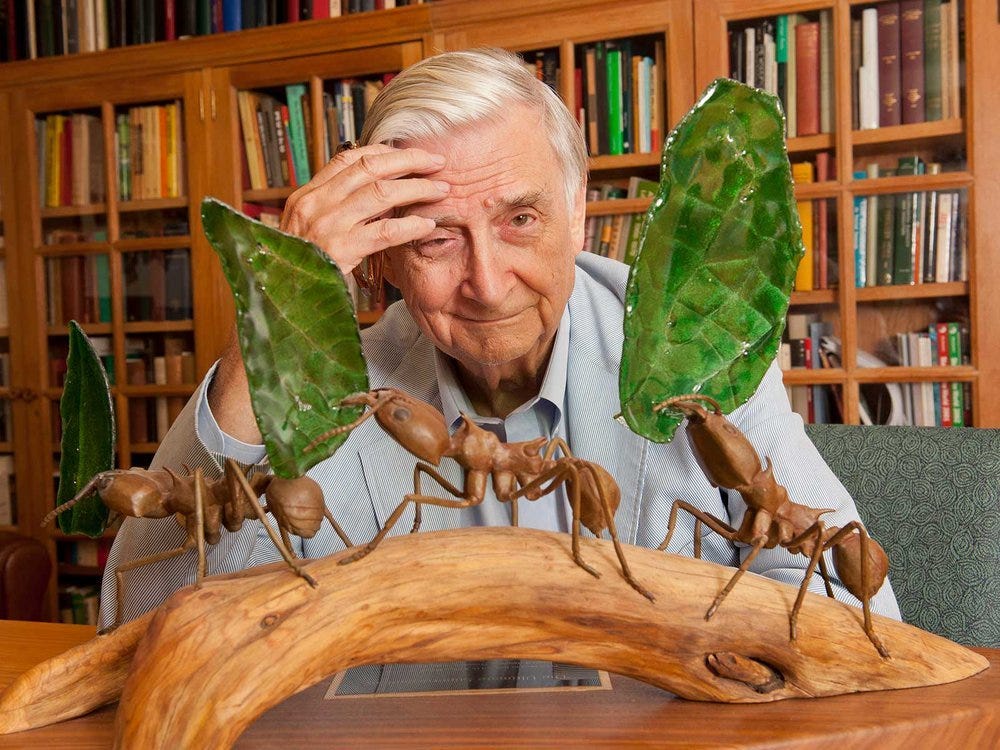Why E.O. Wilson should matter to animal rights supporters
The pioneering ant scientist made profound insights into another social species: human beings
E.O. Wilson, the pioneering biologist and entomologist who, for a generation, pioneered new ways to study the natural world, passed away today. It was sad for me to hear the news. Wilson’s childlike delight in studying the animal kingdom was an inspiration for me. And his studies of ants and other insects transformed the way I saw our littlest cousins.
As a kid, I would use magnifying glasses to pop ants or drop them in spider webs. It seemed all like a big game, with these small creatures as toys in my game. Wilson’s work opened me to a universe of experience I still do not fully understand but that has immense beauty and sophistication. It is that sense of awe that I will remember him for. Indeed, Wilson coined a term for the inherent human love of the Earth’s life: biophilia.
Sadly, Wilson is not being remembered for that crucial insight. Instead, his contributions to “sociobiology” — the idea that social behavior can be explained through natural selection (which has controversially been linked to Social Darwinism) — and to the gene theory of evolution are what most of the obituaries are focusing on. Consider the Times’ take on the latter issue:
“The basic foundations of inclusive fitness theory are unsound,” Dr. Wilson said in a 2012 interview. Instead, he and his colleagues argued, biologists should look to other forms of evolution to explain altruism and other puzzling forms of behavior. Natural selection acting on individuals could explain some; it was possible that groups of animals could be selected as well.
To many scientists who were profoundly influenced by Dr. Wilson’s earlier work, his reversal was disappointing. “It was not the way things should be done, and it was not good science,” Dr. Dugatkin said. He and nearly 150 other evolutionary biologists signed a letter declaring that Dr. Wilson’s arguments were “based upon a misunderstanding of evolutionary theory and a misrepresentation of the empirical literature.”
Richard Dawkins, a leading exponent of inclusive fitness, ruthlessly attacked Dr. Wilson in a review of “The Social Conquest of Earth,” which he said was full of “downright perverse misunderstandings.”
Dr. Wilson dismissed his critics, likening them to early astronomers who came up with elaborate explanations to support their idea that the sun and planets revolved around the earth. Dr. Dawkins called Dr. Wilson’s response “an act of wanton arrogance.”
There are two things to note about this. First, contrary to Dugatkin and Dawkins (the latter of whom I admire immensely, for his beautiful book The Selfish Gene), group selection of various sorts seems to have new evidence to buttress it. And even if it doesn’t, the hateful approach taken by Dawkins, e.g., attacking their former ally Wilson as “perverse” and his ilk surely is not good for science.
The second thing to note is that, as is usually the case, the discussions of Wilson’s legacy in the media mostly focus on these contentious and anxiety-inducing debates. Imagine a media that, instead, focused on areas where Dawkins and Wilson agree, e.g., on humankind’s duty to protect other animals. Wilson thought human encroachment on wild spaces was one of the gravest threats to the future of life. Dawkins has described human commodification of other animals as akin to slavery. Both scholars devoted their considerable intellect to persuading the people around them to take animal protection more seriously.
We should do the same, and honor Wilson’s memory, instead of tarnishing it with the pettiest stories of conflict.


